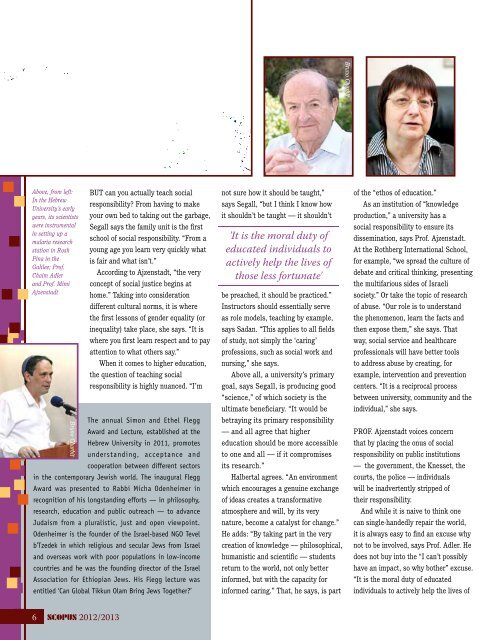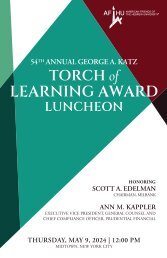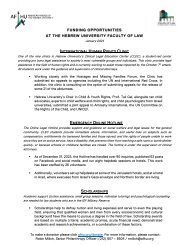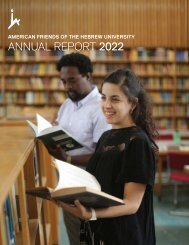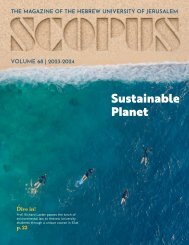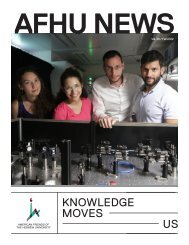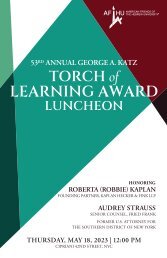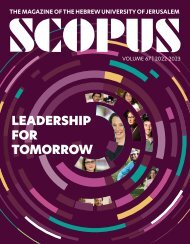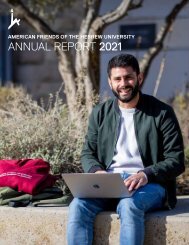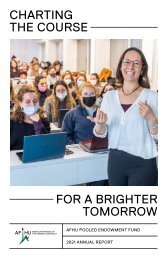You also want an ePaper? Increase the reach of your titles
YUMPU automatically turns print PDFs into web optimized ePapers that Google loves.
Bruno Charbit<br />
Above, from left:<br />
In the Hebrew<br />
University’s early<br />
years, its scientists<br />
were instrumental<br />
in setting up a<br />
malaria research<br />
station in Rosh<br />
Pina in the<br />
Galilee; Prof.<br />
Chaim Adler<br />
and Prof. Mimi<br />
Ajzenstadt<br />
BUT can you actually teach social<br />
responsibility? From having to make<br />
your own bed to taking out the garbage,<br />
Segall says the family unit is the first<br />
school of social responsibility. “From a<br />
young age you learn very quickly what<br />
is fair and what isn’t.”<br />
According to Ajzenstadt, “the very<br />
concept of social justice begins at<br />
home.” Taking into consideration<br />
different cultural norms, it is where<br />
the first lessons of gender equality (or<br />
inequality) take place, she says. “It is<br />
where you first learn respect and to pay<br />
attention to what others say.”<br />
When it comes to higher education,<br />
the question of teaching social<br />
responsibility is highly nuanced. “I’m<br />
The annual Simon and Ethel Flegg<br />
Award and Lecture, established at the<br />
Hebrew University in 2011, promotes<br />
understanding, acceptance and<br />
cooperation between different sectors<br />
in the contemporary Jewish world. The inaugural Flegg<br />
Award was presented to Rabbi Micha Odenheimer in<br />
recognition of his longstanding efforts — in philosophy,<br />
research, education and public outreach — to advance<br />
Judaism from a pluralistic, just and open viewpoint.<br />
Odenheimer is the founder of the Israel-based NGO Tevel<br />
b’Tzedek in which religious and secular Jews from Israel<br />
and overseas work with poor populations in low-income<br />
countries and he was the founding director of the Israel<br />
Association for Ethiopian Jews. His Flegg lecture was<br />
entitled ‘Can Global Tikkun Olam Bring Jews Together?’<br />
Bruno Charbit<br />
not sure how it should be taught,”<br />
says Segall, “but I think I know how<br />
it shouldn’t be taught — it shouldn’t<br />
'It is the moral duty of<br />
educated individuals to<br />
actively help the lives of<br />
those less fortunate'<br />
be preached, it should be practiced.”<br />
Instructors should essentially serve<br />
as role models, teaching by example,<br />
says Sadan. “This applies to all fields<br />
of study, not simply the ‘caring’<br />
professions, such as social work and<br />
nursing,” she says.<br />
Above all, a university’s primary<br />
goal, says Segall, is producing good<br />
“science,” of which society is the<br />
ultimate beneficiary. “It would be<br />
betraying its primary responsibility<br />
— and all agree that higher<br />
education should be more accessible<br />
to one and all — if it compromises<br />
its research.”<br />
Halbertal agrees. “An environment<br />
which encourages a genuine exchange<br />
of ideas creates a transformative<br />
atmosphere and will, by its very<br />
nature, become a catalyst for change.”<br />
He adds: “By taking part in the very<br />
creation of knowledge — philosophical,<br />
humanistic and scientific — students<br />
return to the world, not only better<br />
informed, but with the capacity for<br />
informed caring.” That, he says, is part<br />
of the “ethos of education.”<br />
As an institution of “knowledge<br />
production,” a university has a<br />
social responsibility to ensure its<br />
dissemination, says Prof. Ajzenstadt.<br />
At the Rothberg International School,<br />
for example, “we spread the culture of<br />
debate and critical thinking, presenting<br />
the multifarious sides of Israeli<br />
society.” Or take the topic of research<br />
of abuse. “Our role is to understand<br />
the phenomenon, learn the facts and<br />
then expose them,” she says. That<br />
way, social service and healthcare<br />
professionals will have better tools<br />
to address abuse by creating, for<br />
example, intervention and prevention<br />
centers. “It is a reciprocal process<br />
between university, community and the<br />
individual,” she says.<br />
PROF. Ajzenstadt voices concern<br />
that by placing the onus of social<br />
responsibility on public institutions<br />
— the government, the Knesset, the<br />
courts, the police — individuals<br />
will be inadvertently stripped of<br />
their responsibility.<br />
And while it is naive to think one<br />
can single-handedly repair the world,<br />
it is always easy to find an excuse why<br />
not to be involved, says Prof. Adler. He<br />
does not buy into the “I can’t possibly<br />
have an impact, so why bother” excuse.<br />
“It is the moral duty of educated<br />
individuals to actively help the lives of<br />
6 <strong>2012</strong>/<strong>2013</strong>


